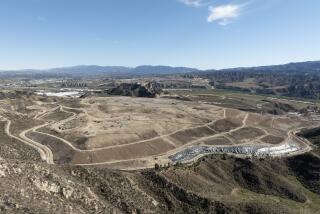Tycoon and Inner City Crew Start Cleanup in Tuna Canyon : Environment: The work comes as a surprise to those who had watched as the Santa Clarita businessman’s Malibu property deteriorated amid the trash.
- Share via
He zipped into Tuna Canyon in his jet black, 200-horsepower Vector TwinTurbo, the one with the doors that open upward like the Batmobile.
Bare-chested and tanned, he plunged into a long-awaited cleanup of his trash-strewn Malibu property, working right alongside 20 young men and women he had bused in from South-Central Los Angeles.
Some of the workers acknowledged they were members of the 107 Hoover Street Crips, but to millionaire hair-care titan and environmental activist John Paul Jones De Joria, co-founder of Santa Clarita-based Paul Mitchell Systems, they were just people in need of a job.
“Gang members don’t want to be known as gang members any more,” De Joria said. “They want to be members of the community.”
The cleanup came as an unexpected surprise to those who have watched with increasing alarm as the condition of Tuna Canyon, one of the last undeveloped coastal canyons in the region, deteriorated. Only two weeks ago, a Times article quoted the head of a statewide environmental group, California Environmental Project, who sharply criticized De Joria for ignoring repeated requests to clean up the canyon, much of which he purchased with a partner three years ago.
But on Thursday, the co-founder of the environmental group, Scott Mathes, had only good things to say about De Joria, who led the assault on a small patch of woods containing an estimated 3,000 pounds of scrap wood and metal. Within hours, most of the mess had been transferred to the roadside and was ready to be hauled out of the Santa Monica Mountains.
“The fact that he’s working out here impresses me,” Mathes said of De Joria, whose environmental causes include solar power projects and preservation of rain forests. “It would be very easy for him to sit in his office and say, ‘Here’s the money--go do it.”
De Joria said the cleanup was not so much a response to negative publicity as an element of a long-term cleanup of Tuna Canyon. Eventually, he said, he hopes to reroute Tuna Canyon Road to the north so it doesn’t run parallel along the canyon bottom next to Tuna Canyon Creek. Once that is accomplished, he said, he hopes to donate a chunk of the land to the city or the state for a park.
Mathes, however, warned that while moving Tuna Canyon Road might ultimately be desirable, it’s risky.
“It sounds good, but the whole process of moving that road is going to entail a lot of construction and bulldozers--a lot of changes that may not all be beneficial.”
The game plan for removing the trash is somewhat simpler.
De Joria is paying his workers $50 a day to lug thousands of pounds of junk out of the canyon. The crew was expected to take the weekend off, then return Monday morning to finish the job. Initially, De Joria had predicted the cleanup would take five full days, but he was so impressed by the progress of Thursday’s effort that he predicted three days would suffice.
Mathes was somewhat more cautious, noting that much of the remaining refuse, including several cars, lies in more demanding terrain.
“Removing it is going to take some ingenuity and thought,” he said.
It will also take some knowledge of the outdoors. Early Thursday, Mathes gave the workers basic instructions on avoiding snakes, poison ivy, wasp nests and other dangers not often confronted in South-Central Los Angeles.
Dyasha Fontenot, 21, caught on quickly to the necessities of the canyon country.
“The sticks--you make sure they don’t move,” she said.
The rigors of the hill country were tempered somewhat by a touch of Westside elegance. Between helping out with the cleanup and confirming a dinner date with Clint Eastwood over his cellular phone, De Joria managed to provide a lunch of gourmet ham sandwiches and pasta salad with pesto, all catered by Bikini of Santa Monica, a new restaurant of which De Joria is a part-owner.
The pace of the cleanup seemed to slow after that. “Everyone kind of pooped out,” Mathes said.
But crew member Darrell Robinson promised that the workers would not squander what they consider an important opportunity.
“It’s going to be clean--that’s what we were paid to do,” he said.
More to Read
Sign up for Essential California
The most important California stories and recommendations in your inbox every morning.
You may occasionally receive promotional content from the Los Angeles Times.










